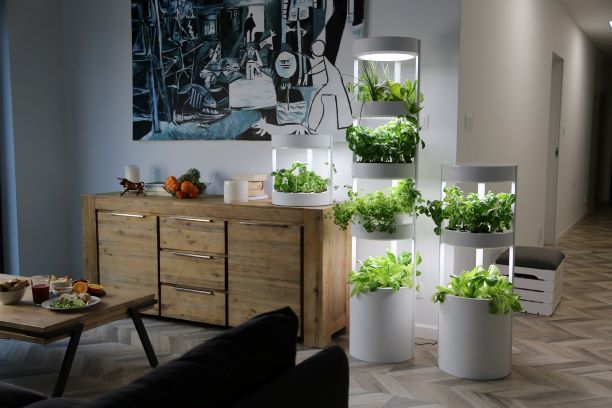

Poland-based Verdeat announced this week it will launch a Kickstarter campaign in July for its modular vertical farm meant to fit inside apartments, offices, and other non-commercial spaces.
Verdeat’s vertical garden will be able to cultivate most plants without the use of soil, though unlike a lot of systems, the 35 cm cylindrical device will still accommodate soil in certain configurations. The modular trays that come with the device can be switched out based on what you’re trying to grow, whether seeds and sprouts, which get planted in a substrate (like coconut fiber), or a potted basil plant you nabbed at the grocery store.
Read More: Greenhouse Farming: A viable future or a financial burden?
The entire system is controlled by a smartphone app that takes the majority of the guesswork out of the growing process: from knowing how much water to give each type of plant to how to adjust the LEDs to produce the right amount of sun-like light. The user simply fills the grow tray, adds some nutrients, and starts the app, which, according to Verdeat, can run the farm more or less autonomously, only requiring the user to add nutrients every one to three weeks depending on the plants.
The company also said that plants in the Verdeat system grow faster and ripen 40 percent sooner than traditionally grown herbs and vegetables. At the moment, Verdeat’s system can grow the usual selection of herbs and leafy greens found in most vertical farms, as well as strawberries, peppers, blueberries, and other fruits.
Once the Kickstarter campaign launches, backers will be able to choose from a small, medium, or large device, depending on their individual space requirements. Verdeat definitely fits that criteria.
With the vertical farming market expected to be worth $9.96 billion by 2025, we are likely to see many more of these at-home versions of the vertical farm surfacing alongside more industrial-sized, hyper-automated counterparts.
How Verdeat fares amid all this competition will depend largely on some factors the company hasn’t yet released, including the cost of each device unit, how widely available it will be (it’s manufactured in the EU), and how long backers will have to wait before they can actually get their hands on the device and start growing.
We remain hopeful that Verdeat’s system or similar products from Seedo or Ogarden will soon expand to other Asian Pacific countries.
As Kerala strives towards a sustainable future, the Kochi Water Metro Limited (KWML) has revealed…
Kundan Green Energy has acquired Jabalpur MSW Pvt. Ltd., a well-established Waste-to-Energy plant that was…
Agriculture waste to energy conglomerate SAEL is preparing to go public within the next 12…
The Cuttack Municipal Corporation (CMC) and Oil India Limited (OIL) have come together to develop…
India’s Ethanol Blended Petrol (EBP) Programme has emerged as a global benchmark in clean energy…
Refex Renewables & Infrastructure Ltd. has announced that its wholly-owned subsidiary, Refex Green Power, has…